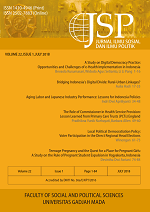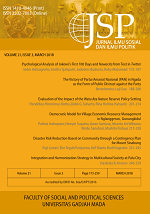Democracy Crisis in South-East Asia: Media Control, Censorship, and Disinformation during the 2019 Presidential and General Elections in Indonesia, Thailand and 2019 Local Election in the Philippines
Aniello Iannone(1*)
(1) Departement of Politic and Government, Faculty of Social and Political Sciences, Universitas Diponegoro, Indonesia.
(*) Corresponding Author
Abstract
South-East Asia is suffering a rapid deterioration of the free press and Freedom of expression. According to the last report of Freedom in the World 2021, in the last few years, almost all the South-East Asian countries have experienced a reduction in Freedom of expression, and in certain cases, their rights have been restricted. What kind of effects do the media have on public opinion? How can disinformation, censorship, and media control manipulate public opinion? Is social media promoting the anti-democracy establishment? Does social media reduce the democratic quality of a country by limiting its expression through control? This paper is based on desk-based research, where literature on political history and the political history of using media has been reviewed and analyzed—with a comparative analysis, focusing on the data available on the three countries of interest: Indonesia, Thailand, and the Philippines, taking a comparative study the last election in 2019 in those countries. As a method, this study conducts a critical literature review with a historical approach. This study found that all the countries analyzed utilized the media to spread disinformation, war propaganda, and control. Borrowing from the Gramscian theory of hegemony, the paper argues that the theory of media and control can be used as a theoretical framework to examine the rule of media to manipulate and control the public opinion.
Keywords
Full Text:
PDFReferences
Altheide, D. L. (1984). Media Hegemony: A Failure of Perspective. Public Opinion Quarterly , 48 (2), 476. https://doi.org/10.1086/268844
Althusser, L. (1972). Lenin and Philosophy and Other Essays. Monthly Review Press, 14.
Arao D.,A. (2021). freedom-is-no-joke-in-the-philippines/.Https://Www.Eastasiaforum.Org/2021/11/07/Press-.
ARTICLE 19, Center for Media Freedom and Responsibility (CMFR). (2005). Freedom of Expression and the media in the Philippines.
Bates, T. R. (1975). Gramsci and the Theory of Hegemony. Journal of the History of Ideas, 36(2), 351. https://doi.org/10.2307/2708933
Bunn, M. (2015). REIMAGINING REPRESSION: NEW CENSORSHIP THEORY AND AFTER. History and Theory, 54(1), 25–44. https://doi.org/10.1111/hith.10739
Cabañes, J, Anderson C.W. and Ong J.C. (2019a). Ong J.C. (2019). Fake News and Scandal . In The Routledge Companion to Media. In Companion to Media and Scandal edited by Howard Tumber and Silvio Waisbord. Routledge.
Cabañes, J., Cornelio J. (2017). The Rise of Trolls in the Philippines. Ateneo de Manila University , 411–427. https://doi.org/ https://orcid.org/0000-0001-6276-9198
Cacique Democracy in the Philippines: Origins and Dreams. (1988). New Left Review, 169, 3–31.
Chattharakul, A. (2019). Social Media: Hashtag #Futurista. Contemporary Southeast Asia, 41(2), 170–175.
Combinido, P. and Curato N. (2021a). Curing “Patient Zero: Reclaiming the Digital Public. In From Grassroots Activism to Disinformation Social Media in Southeast Asia edit by Aim Sinpeng and Ross Tapsell. ISEAS Yusof Ishak Institute.
Curato, N. (2017a). Flirting with Authoritarian Fantasies? Rodrigo Duterte and the New Terms of Philippine Populism. Journal of Contemporary Asia, 47(1), 142–153.
D. Gianan, E. R. (2020). Disinformation Trends in Southeast Asia: Comparative Case Studies on Indonesia, Myanmar, and the Philippines. Journal of Southeast Asian Studies, 25(1), 1–27. https://doi. org/10.22452/jati.vol25no1.2
Dresang, J. (1985). Authoritarian Controls and News Media in the Philippines. Contemporary Southeast Asia, 7(1), 34–47. https://doi.org/10.1355/CS7-1C
Dressel, B. (2009). Thailand’s Elusive Quest for a Workable Constitution, 1997–2007. Contemporary Southeast Asia, 31(2), 296–325. https://doi.org/10.1355/cs31-2e
Evangelista, P. and Curato N. (2016). WATCH: The Imagined President. Https://Www. Rappler.Com/Nation/Elections/132377- Watch-Imagined-President-Patricia-Evangelista-Nicole-Curato/.
Foucault, M. (. (1980). History of Sexual. Vintage Books.
Freedom House. (2017). Freedom on the Net 2017: Manipulating Social Media to Undermine Democracy. https://freedomhouse.org/
Freedom House. (2020). A Leaderless Struggle for Democracy. https://freedomhouse.org
Freedom House. (2021). Democracy under Sienge. Highlights from Freedom House’s annual report on political rights and civil liberties.
Ganjanakhundee, S. (2020). Social Media and Thailand’s Struggle over Public Space. 67, 1–10.
Gramsci, A. (1971). Selections from the Proson Notebook. Edit and Translated by Hoare Q. and Smith N.
Herdiansah, A. G., Husin, L. H., & Hendra, H. (2018). Religious Identity Politics on Social Media in Indonesia: A Discursive Analysis on Islamic Civil Societies. Jurnal Studi Pemerintahan, 9(2). https://doi. org/10.18196/jgp.2018.0186.187-222
Hui, J. Y. (2020). SOCIAL MEDIA AND THE 2019 INDONESIAN ELECTIONS. Southeast Asian Affairs, 155–172. https:// doi.org/DOI: 10.1355/9789814881319-010
Human Rights Watch. (2019). Thailand: Structural Flaws Subvert Election Stacked Senate, Media Restrictions, Repressive Laws Undermine Right to Vote. hrw.org/ news/2019/03/19/thailand-structural- flaws-subvert-election
Kongkirati, P. (2014). The Rise and Fall of Electoral Violence in Thailand: Changing Rules, Structures and Power Landscapes, 1997-2011. Contemporary Southeast Asia, 36(3), 386–416. https://doi.org/10.1355/cs36-3c
Laing,, M. McCaffrie B. (2020). Historical Approaches to the Study of Political Executives. In The Oxford Handbook of Politiacal Executives. Oxford University Press.
Lawattanatrakul, A. (2019). A Country for the Young: First-Time Voters in the 2019 General Election and How They Can Change the Face of Thai Politics. Https:// Prachatai.Com/English/Node/7984.
Lent, J. (1975). Underground Press Fills the Gaps in the Philippines. Philippine News. Philippine News.
Lent, J. (1976). Philippine Mass Media Thirty Years after Independence: Not Very Independent. Asian Studies on the Pacific Coast confer.
Lertchoosakul, K. (2020). THAILAND IN 2019: The Year of Living Unpredictably. Southeast Asian Affairs, 337–354.
Lim, M. (2012). The league of thirteen media concentration in ndonesia. Participatory media lab.
Lim, M. (2017). Freedom to hate: social media, algorithmic enclaves, and the rise of tribal nationalism in Indonesia. Journal of Critical Asian Studies, 49(3), 411–427. https://doi. org/http://dx.doi.org/10.1080/14672715.2017.1341188
Liu, Y. (2014). Transgressiveness, civil society and Internet control in Southeast Asia. The Pacific Review, 27(3). https://doi.org/ https://doi.org/10.1080/09512748.2014.909520
Madrigal, A. (2017). What Facebook Did to American Democracy. Https://Www.Theatlantic.Com/Technology/Archive/2017/10/Whatfacebook-Did/542502/.
Maisrikrod, S. (1993). THAILAND 1992: Repression and Return of Democracy. Southeast Asian Affairs, 327–349.
McCargo, D. (2017). New Media, New Partisanship: Divided Virtual Politics In and Beyond Thailand. International Journal of Communication, 11, 4138–4157.
Mishra N.,K. (2008). Governmental Threats for media freedom : comparative study of asian countries. The Indian Journal of Political Science, 69(1), 149–156.
Neher, C.,D. (1992). Political Succession in Thailand. Asian Survey, 32(7), 585–605.
Neher, C.,D. (1995). Democratization in Thailand. Asian Survey, 21(4), 195–2019.
Nolan, J. (2021). Are Indonesia’s “rubber” laws limiting freedom of speech ? Lowyinstitute. https://www.lowyinstitute.org/the- interpreter/are-indonesia-s-rubber-laws- limiting-freedom-speech
Nursalikah, A. (2019). Indonesia holds most complex election. Https://Republika. Co.Id/Berita/En/National-Politics/19/04/23/ Pqdhwi366-Indonesia-Holds-Most-Complex- Election.
Nyblade, B., O’M ahony, A., & Sinpeng, A. (2015). Social Media Data and the Dynamics of Thai Protests. Asian Journal of Social Science, 43(5), 545–566. https://doi. org/10.1163/15685314-04305003
Ong, J.,C. Cabañes J.,V. (2018). Architects of Nerworked Disinformation. Behind the Scenes of Troll Accounts and Fake News Production in the Philippines.
Ong, J.,C. Tapsell R. (2020). M iti gating Disinformation in Southeast Asian election: a lesson from Indonesia, Philippines and Thailand. NATO Strategic Communications Centre of Excellence.
Ong, J.,C, TapsellR., Caruto N. (2019). Tracking Digital Disinformation in the 2019 Philippine Midterm Election. NewMandala.
Panaspornprasit, C. (2017). THAILAND: The Historical and Indefinite Transition. Southeast Asian Affairs, 353–366.
Paribatra, S. (1993). State and Society in Thailand: How Fragile the Democracy? Asian Survey, 33(9), 879–893.
Pertierra, A. (2017). Celebrity Politics and Televisual Melodrama in the Age of Duterte. In A Duterte Reader: Critical Essays on Rodrigo Duterte’s Early Presidency, edited by Nicole Curato. Ateneo de Manila University Press.
Phongpaichit, P., Baker C. (2008). Thailand: Fighting over Democracy. Economic and Political Weekly, 43(50), 18–21.
Plagemann, J., Ufen A. (2017). Varieties of Populism in Asia. German Institute of Global and Area Studies GIGA Focus Asia, 7.
Prachatai. (2019). Programming will return shortly ‘ : International news media broadcasts censored? Https://Prachatai.Com/English/Node/7969.
Quimpo, N.,G. (2004). Southeast Asian Affairs, 277–294.
Robison, R., Hadiz V.,R. (2004). ‘Reorganising Power in Indonesia: The politics of oligarchy in an age of markets.’ Routledge Curzon.
Robison, R., Hadiz V.,R. (2013). The Political Economy of Oligarchy and the Reorganization of Power in Indonesia. Wealth, Power, and Contemporary Indonesian Politics, 96, 35–57.
Rosenberg, D.,A. (1975). Civil Liberties and the Mass Media under Martial Law in the Philippines. Pacific Affairs, 47(4), 472–484.
Sasukjit, P. (2019). Thanathorn with Hashtag #Fah Rak Pho and #Pho Kor Rak Where Do They Come From?/Www. Thebangkokinsight.Com/102305/.
Sinpeng, A. (2016). How Duterte won the election on Facebook. Https://Www. Newmandala.Org/How-Duterte-Won-the- Election-on-Facebook/.
Sinpeng, A. (2017). Participatory Inequality in Online and Offline Political Engagement in Thailand. Pacific Affairs, 90(2), 253–274.
Sinpeng, A. (2021). Opposing Democracy in the Digital Age, The Yellow Shirts in Thailand.
Sombatpoonsiri, J. (2018). Manipulating Civic Space: Cyber Trolling in Thailand and the Philippines. German Institute of Global and Area Studies GIGA Focus Asia, 3.
Sombatpoonsiri, J. (2020). From Repression to Revolt: Thailand’s 2020 Protests and the Regional Implications. German Institute of Global and Area Studies GIGA Focus Asia.
Sopranzetti, C. (2016). Thailand’s Relapse: The Implications of the May 2014 Coup. The Juornal of Asian Studies, 72(2), 299–316.
Tapsell, R. (2012). Old tricks in a new era: Self- censorship in Indonesian journalism. Asian Studies Review, 36(2), 227–245.
Tapsell, R. (2015). Indonesia’s Media Oligarchy and the “Jokowi Phenomenon. Southeast Asia Program, 99, 29–50.
Tapsell, R. (2017). Media power in Indonesia: oligarchs, citizens and the digital revolution. Rowman & Littlefield International, Ltd.
Tapsell, R. (2020). Deepening the understanding of social me dia’s impact in Southeast Asia. http://public.eblib.com/choice/ PublicFullRecord.aspx?p=6185672
Teehankee, J. C. (2016). Duterte’s Resurgent Nat ionalism in the Philippines: A Discursive Institutionalist Analysis. Journal of Current Southeast Asian Affairs, 35(3), 69–89.
Thompson, M. R. (2026). The Early Duterte Presidency in the Philippines. Journal of Current Southeast Asian Affairs, 35(3), 3–14.
Thornley, A. (2014). Indonesia’s Social Media Elections. http://asiafoundation.org/in- asia/2014/04/02/indonesias-social-media-elections
Watts, D. J., Rothschild D. M., Mobius M. (2021). Measuring the news and its impact on democracy. Pennsylvania, Philadelphia, PNAS, 118(15). https://doi.org/https://doi. org/10.1073/pnas.1912443118
Wijayanto. (2019). Bourdie and Media Thoery: Explaining Media’s Changes and Continuties in The Post Authoritarian Countries. Politik Indonesia: Indonesian Political Science Review, 4(2), 274–300.
Winters, J. (2011). Oligarchy. Cambridge University Press.
Youngblood, R. L. (1981). Government-Media Relations in the Philippines. Asian Survey, 21(7), 710–728.
Article Metrics
Refbacks
- There are currently no refbacks.
Copyright (c) 2022 Jurnal Ilmu Sosial dan Ilmu Politik

This work is licensed under a Creative Commons Attribution-NonCommercial-NoDerivatives 4.0 International License.






















